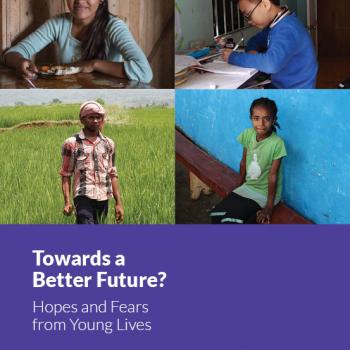Publication Information

Young Lives has been following 12,000 children in Ethiopia, India, Peru and Vietnam since 2002. This is the third book about the lives of 24 of those children. We have watched them as they started primary and then secondary school, and we have seen many of them grow into young adults. They have shared their hopes and their fears with us, their ideas about themselves, their families and their communities.
Growing up has meant more independence – and more responsibility. There is pressure to conform to wider social norms and expectations. Gender has become more significant as the children move into adolescence and beyond, and decisions about school, work, marriage and fertility are made within families and communities.
We believe that the views and experiences of the children in our study are key to understanding childhood poverty and in helping to identify effective policies and practices to tackle it. As the mother of Teje, who is 13 and from Ethiopia, said: “I want development for all human beings and I want everyone to have a comfortable life. I want this research to contribute to that.”

Young Lives has been following 12,000 children in Ethiopia, India, Peru and Vietnam since 2002. This is the third book about the lives of 24 of those children. We have watched them as they started primary and then secondary school, and we have seen many of them grow into young adults. They have shared their hopes and their fears with us, their ideas about themselves, their families and their communities.
Growing up has meant more independence – and more responsibility. There is pressure to conform to wider social norms and expectations. Gender has become more significant as the children move into adolescence and beyond, and decisions about school, work, marriage and fertility are made within families and communities.
We believe that the views and experiences of the children in our study are key to understanding childhood poverty and in helping to identify effective policies and practices to tackle it. As the mother of Teje, who is 13 and from Ethiopia, said: “I want development for all human beings and I want everyone to have a comfortable life. I want this research to contribute to that.”

